Gary Neal Hansen's Blog, page 27
February 4, 2019
Monday Meditation: RCL Year C, 5th Sunday after Epiphany, Luke 5:1-11
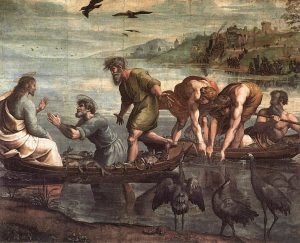
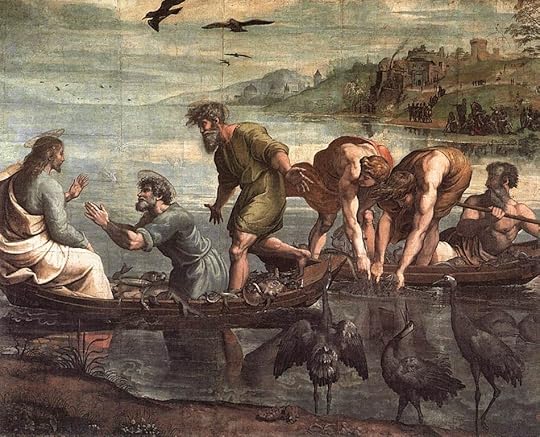 Raphael, The Miraculous Draught of Fishes (1515)
Raphael, The Miraculous Draught of Fishes (1515)On the 5th Sunday after Epiphany, the lectionary skips forward to a new chapter. Maybe they were aiming to keep Jesus from a tiny bit of embarrassment: Luke 4:31-44 recorded the wonders Jesus did in Capernaum, which back in 4:23 he seemed to say were already in the past.
Luke 5:1-11 records the calling of the first disciples, in the context of a famous miraculous catch of fish. By my reckoning, looking only at the highlights, the logic of Luke’s narrative runs something like this:
Jesus is miraculously conceived and born as God’s own son.
Jesus is baptized, and there God proclaimed him the incarnation of the 2nd Person of the Trinity.
Jesus quietly proves his power by defeating Satan’s temptations in the wilderness.
Jesus begins his pubic ministry, proclaiming himself the promised Messiah, provoking his home town congregation into a murderous rage.
Jesus goes to Capernaum and does a series of miracles proving his call as Messiah.
And now, with everyone’s attention firmly fixed on him, he begins to call his disciples.
Luke 5:1-11
The story is pretty simple, and probably pretty familiar:
On the seashore with a large crowd waiting to hear him teach, Jesus steps into Simon Peter’s boat. When class is over, Jesus tells Simon where to cast his nets, and he pulls in a big catch, which James and John help bring to shore. Simon is so blown away that he bows down before Jesus, confessing his sinfulness. Jesus turns the tables on him, proclaiming that Peter will stop fishing for fish and start catching people.
The interest, I find, is in the little details. Some clarify points of fact and others take us to meanings worth weighing heavily.
1. A Clarification
After a half-jillion readings of this passage, today I finally noticed a crucial detail here.
You always seem to see Peter, James, and John together in the Gospels — like at the transfiguration, or in the Garden of Gethsemane. I think I assumed they just became close friends with each other because they all spent so much time together following Jesus.
Luke tells us that it actually worked the other way around.
They didn’t just happen to be in the same line of work, all fishing the waters of Galilee.
No. Before they ever met Jesus, Peter, James, and John were business partners. It’s right there in Luke 5:10. James and John came to help Peter pull in his nets because the
…sons of Zebedee … were partners with Simon. (Luke 5:10)
How did I miss that?
2. A Context
My second little detail is about the context — Jesus’ demanding ministry.
Mark is much more prone than Luke to show how enormously popular Jesus was.
In Mark, heaps and gobs of people came to him, even figuring out where he was going next to get there before he did. Jesus seems to have taught, healed, fed, and otherwise cared for each of them and all of them till he has to go up the mountain for prayer and solitude.
Here in Luke we get fewer hints of that overwhelming quality of Jesus’ popularity. But it is there in this passage.
Picture Jesus on the lakeshore. People start to gather. More people come. The beach is full. Jesus is surrounded. They are pressing him closer and closer to the water. How’s he supposed to survive, much less teach them all?
(Okay, I suppose he could have just stood on the water, but we don’t know that yet.)
Well, as timing would have it, Simon Peter and his business partners have finished their night of fishing and they are on the shore cleaning their nets. Jesus steps into Simon’s boat and convinces him to push off a bit.
Voila! Jesus is safe from the crushing crowd, and he has also turned the lake and shore into a sort of natural amphitheater.
Takeaway: Jesus, even before he had disciples, was becoming enormously popular. And quite clever.
And maybe he was realizing he needed to winnow the numbers a bit, and focus his best attention on just a few. (Hey, maybe these guys in the boats would do?)
3. A Phrase
The moment I find most evocative happens when the teaching is done and the crowd has cleared. Jesus is ready to turn his attention to Simon and his friends. What does he say?
Put out into the deep water…
We are quicker to notice the next phrase:
…and let down your nets for a catch.” (Luke 5:4 NRSV)
After all, when they put down the nets, they filled up till they almost burst, till the boats almost sank. Very dramatic.
The instruction to drop the nets is also appealing (and surely intentionally symbolic) because it pairs up so nicely with the calling Simon receives at the end:
Do not be afraid; from now on you will be catching people.” (Luke 5:10 NRSV)
The miraculous catch matches our modern focus on measurable results, and Simon’s call matches up with both our individualism and our sense of mission.
But it all depended on that first little phrase.
Put out into the deep water…
If we as individuals or as churches are going to do it Jesus’ way, we need to start with that first little phrase:
Put out into the deep water…
We can’t live in the shallows. Our comfortable ways of worship and the unchanging day-to-day lives we think of as faith aren’t going to get us to the place where we can put the nets down, fill them up miraculously, and become fishers of people.
We need to find our way into lives of depth — connecting in deeper ways with Christ himself, rather than just filling our Christian lives with busyness.
We need to find ways to reflect more deeply on who we are, and how we are responding to our lives and callings.
We need find deeper ways to bring all we are to Christ, to be healed, and changed, and sent.
That’s what happened to Simon. The professional fisherman took the advice of Jesus, the apparent amateur, and set out for the deep water.
What happened in the deep water stunned him into the deepest response of his life. He was so struck by the contrast between his own heart and this mysterious Jesus who stood before him that he tried to send him away.
Because Simon had begun to go out into the deep water, to live in the depths, Jesus could work with him.
Jesus smiled at Simon’s attempt to drive him away.
No, Simon, don’t go away. This honesty is a great starting place. Leave the nets behind. I’ve got work for you to do.
4. A Surprise
Finally comes the most surprising bit. Peter, James, and John had just pulled in two boats full of fish — boats so full they almost sank under the weight. It was the biggest catch of their lives.
And then they just left with Jesus. They abandoned it all on the shore — nets, boats, and a whole, er, boatload of fish.
What do you suppose happened to all those fish?
++++++++++++
There’s no better way to start living in the depths with Jesus than to work on deepening your prayer life. My annual lenten prayer class will open for registration soon. If you want me to let you know when it opens up, click on this button and get on the waiting list!
The post Monday Meditation: RCL Year C, 5th Sunday after Epiphany, Luke 5:1-11 appeared first on Gary Neal Hansen.
January 31, 2019
Monday Meditation: RCL Year C, 4th Sunday after Epiphany, Luke 4:21-30
 How Luke 4:21-30 ALMOST ended
How Luke 4:21-30 ALMOST endedI told you last week that the lectionary gave us only half of a story: Jesus came to his hometown synagogue and proclaimed himself the Messiah. Everyone seemed happy about it.
This week (the 4th Sunday after Epiphany) we get to see the the rest of the story, in which the mob tries to throw Jesus off a cliff.
And what an interesting tale it is, especially when you compare it with the other Gospels.
Luke 4:21-30
First Luke tells this story at a very different time than the other Gospels. By Luke’s telling, as soon as Jesus was baptized by John and tempted by the devil, he went around teaching.
This visit to Nazareth is an early stop on that tour. Luke has, up to that time, told of precisely zero miracles and he records precisely zero bits of Jesus’ teaching. That makes his claim to have fulfilled Isaiah’s prophesy especially bold.
In Matthew and Mark, Jesus first went to Capernaum. Much later on he went back to Nazareth to impress his old neighbors with his learning. (That’s Matthew 13:53-58 and Mark 6:1-6. John scatters bits that sound like this story in chapters 4, 6, 7, and 10.)
And at least one detail of Luke’s version of the story doesn’t really make much sense without details from Matthew and Mark, as we shall see.
It plays out like a three-act drama.
Act One: They Like Jesus
Okay, Act One started last week, but it continues here. Once Jesus proclaimed himself to be the Messiah, everybody seemed to approve.
Everybody spoke well of him, according to verse 22.
The Amazon reviews poured in:
Amazing!
Gracious!
Five stars!
He’s Joseph and Mary’s kid — I was at his bar mitzvah. I knew he’d do well.
It’s the old story: hometown boy makes good.
Act Two: Jesus Taunts Them
But it seems Jesus didn’t know how to handle the compliments. As Act Two begins Jesus starts to taunt them.
He suggests that they have some secret critical thoughts about him. And some of them are kind of odd.
Doubtless you will quote to me this proverb,
‘Doctor, cure yourself!’
To me that doesn’t make a lot of sense. Jesus had claimed that God’s Spirit had anointed him to start healing others. But he hadn’t shown himself to have any problems that needed curing — so why would they say he needed to cure himself?
In case the congregation was confused by this accusation, Jesus came up with another:
And you will say,
‘Do here also in your home town
the things that we have heard you did at Capernaum.’ (Luke 4:23 NRSV)
That had to be even more baffling, since Luke hasn’t mentioned him even going to Capernaum, much less doing anything special there.
Ah, but maybe someone spoke up and Luke just didn’t record it:
I was reading this other Gospel, you know? And the writer, Matthew, said that before Jesus called any followers he moved away from Nazareth and made Capernaum his new home.
Then maybe someone else spoke up:
Oh, right. You know I was reading a Gospel by a guy named Mark, and he said that after he first preached in Galilee and called some disciples, then Jesus went to Capernaum and did a bunch of miracles there — he cast out a demon, and healed Peter’s mother in law, and then a huge crowd, like the whole town, came and he healed everybody.
The first guy agrees:
Yeah, what Jesus said to us this morning totally makes more sense if you’ve read Mark.
Spoiler alert: All that stuff happens in the next passage according to Luke’s timeline.
*Luke frantically scribbles notes for the second edition*
Jesus, however, thinks he’s really made his case:
And he said,
‘Truly I tell you, no prophet is accepted in the prophet’s home town.’ (Luke 4:24 NRSV)
Now if they hadn’t been confused about the doctor thing or the Capernaum bit, here I think they must have been brought up short:
Hey, what does he mean he isn’t accepted here? Didn’t we say he was amazing? Didn’t we say his words were gracious? I, for one, was feeling really proud of him.
So then, just when he has them where he wants them, maybe, sort of, well, Jesus drops the ambiguity:
He tells two little Bible stories about times God left the people of Israel behind and offered help to foreigners.
But the truth is, there were many widows in Israel in the time of Elijah, when the heaven was shut up for three years and six months, and there was a severe famine over all the land;
yet Elijah was sent to none of them except to a widow at Zarephath in Sidon.
There were also many lepers in Israel in the time of the prophet Elisha,
and none of them was cleansed except Naaman the Syrian.’ (Luke 4:25-27 NRSV)
Implication: Jesus, in the role of Messiah and rejected prophet, will from the very beginning turn his saving attention to outsiders rather than to the hometown crowd.
Act Three: They Try to Kill Him
Thus begins the final act. Really it’s no surprise they were a bit peeved.
But I can’t tell you how many times I had read and heard this passage before even noticing the high drama of the final act. It’s all action:
Praise turns to rage and hatred.
The members of the congregation leave their seats, and rush to the podium.
They drag Jesus down the aisle and out the door.
(Okay, Luke doesn’t mention dragging. But they “drove him out.” It sounds forceful.)
They had a goal in mind. Nazareth was built on a hill. There was a nice scenic overlook, just off the main road out of town where you could see way down into the valley. That would do fine.
They got him up there with the intent to kill. They would, in Luke’s words,
…hurl him off the cliff.” (Luke 4:29 NRSV)
Dramatically it’s a shame Luke tells all of this in one tiny little verse. It is such an emotion-packed moment.
If he already had disciples, like in the other Gospels, they would be seriously questioning their career choices.
Instead as the mob carried Jesus to the brow of the overlook, those guys who had read Matthew and Mark started muttering,
This is gonna be way shorter than those other Gospels.
But then, in a mysterious heartbeat it all changes:
But he passed through the midst of them and went on his way.” (Luke 4:30 NRSV)
Somehow Jesus is free.
Somehow Jesus splits the crowd — like Moses parting the Red Sea.
Somehow Jesus walks quietly into the sunset — like at the end of a Western.
And that’s Luke’s way of saying that Jesus is really far more in control than we had any reason to suspect.
This Jesus,
whom Luke has shown us is the miraculous son of Mary and God,
whom Luke has shown us to be the Second Person of the Trinity at his baptism,
whom Luke showed us defeating Satan in a three round grudge match in the wilderness
really is very much the Messiah whom that passage in Isaiah predicted him to be.
++++++++++++
My annual lenten prayer class is coming soon! We’ll work on classic approaches to prayer that help re-ground us in Christ and bring focus to our prayer lives. Click the button and get on the waiting list if you want to be notified when it is open for registration.
The post Monday Meditation: RCL Year C, 4th Sunday after Epiphany, Luke 4:21-30 appeared first on Gary Neal Hansen.
January 25, 2019
Letters to a Young Pastor: Gregory of Nazianzus and the Nature of Ministry
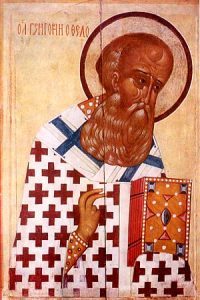
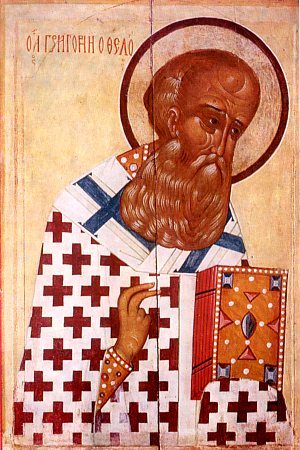 Dear ______:
Dear ______:
I don’t usually write to two days in a row. Basically I never write you except on Thursdays. But I decided to make an exception today. In the East today is the commemoration of one of my favorite saints, Gregory of Nazianzus. I thought it would be a good idea to recommend him to you.
Why?
You are in your last year of seminary. Next year you will, God willing, be serving in full-time pastoral ministry. It is time to be thinking about what the nature of ministry really is.
Thinking About the Nature of Ministry
I could say you need to “think theologically” about pastoral ministry, or I could say you need to develop a “theology of” pastoral ministry. But that sounds so academic.
I want you to get deeply invested in understanding what the Church really is, and what your role will be as a pastor. Those are things that are not defined by sociological characteristics or market forces or the ever-changing whims of culture.
The Church belongs to God and needs to be defined by God. We don’t invent it or create it. It is theological work to explore and articulate the nature of the Church, discerning God’s view of the matter as best we can.
Likewise the ministry, which serves God and the Church, also belongs to God. We don’t invent it. We are called to it by God and we inherit it from the Church and the generations of its servants who have gone this way before us. It is theological work to explore and articulate the nature of the ministry, discerning God’s views of the matter as best we can.
The Modern Fragmentation of Ministry
This is an important point, and one forgotten at our peril.
Instead of defining who we are as ministers and what we do in ministry in theological terms, we develop our views on the fly, based on the demands of the churches that we serve and the tendencies of our culture.
So we end up sometimes thinking the pastor is a counselor, sometimes an administrator, sometimes a teacher, sometimes a recruiter, sometimes a cruise ship activities director — and who knows what else.
The result? Not living from the center of yourself, not grounded in a vocation defined by God, you find yourself broken in pieces, pulled in every direction, trying to be everything everyone else wants you to be.
This point was made most famously by Joseph Sittler in a chapter of his book The Ecology of Faith. (You can read the chapter for free online here.) He called it “The Maceration of the Minister” and it is a brilliant exposition of the problem — even if he was completely wrong about the meaning of the word “maceration.”
Gregory of Nazianzus on the Nature of Ministry
So why do I suggest Gregory of Nazianzus as a mentor and guide?
Well, Gregory is a theologian of the highest rank. In fact, in the Orthodox East he is one of only three saints whose official title is “The Theologian.”
He’s most famous for his role in defining aspects of the doctrine of the Trinity. (You may think that’s abstract stuff, far removed from Christian living, but really it is the core of everything: The Trinity is the God we follow, and love, and trust, and serve. If we misunderstand God we miss the boat entirely.) You can read his most important bits on the topic in his Five Theological Orations.
But he was famous for many centuries for his role in defining the nature of Christian ministry.
Early on, when he was first called to serve, he basically ran away in fear. He wrote a defense of why he did that (which you can read for free here). That essay, or speech really, became the classic explanation of what ministry is — and why it might be scary. For centuries, when people wrote about ministry they borrowed their best bits from Gregory whether they mentioned him or not.
It is great stuff, though the available translation is dated, and Gregory’s style is unfamiliar to modern readers.
But here are the big takeaways:
The minister, as steward of God’s mysteries, the gospel, the Word, the Sacraments, is charged with helping others in the path to salvation.
The minister has to be someone who has directly approached God, and been transformed. That’s the only way a minister has any real wisdom to offer in helping other people live into the life of transforming communion with God, which is the Christian’s calling.
Among Gregory’s expressions:
A minister needs to be someone
whose heart has … been made to burn…with the pure words of God
Someone who has
attained the mind of Christ…and become able to enrich others
The minister should have
beheld, as our duty is to behold it, the fair beauty of the Lord
To serve, one must first have actually
visited His temple, or rather, become the temple of God, and the habitation of Christ in the Spirit
It has to do with our life of prayer. We need to have
by experience and contemplation, … held communion with, … been made partaker of, the Word
By that communion we need to be changed, to learn a new language, a new perspective on the very nature of life. As Gregory puts it we need to have
learnt to speak, the hidden wisdom of God in a mystery
That’s the real requirement. Anyone who hasn’t drawn near and known God personally is basically a fool to take up the calling.
Only if you stay near to God can you guide others near to God.
There is a lot more there, both in Gregory and other ancient, medieval, and Reformation teachers about ministry. But today is Gregory’s day, so I offer him to you!
Blessings
Gary
++++++++++++
There’s no better way to draw near to God for the personal transformation that equips us for ministry than to work at your prayer life. My annual lenten prayer class starts soon. If you want to be sure to get notified when it is open for registration, click the button and get on the waiting list.
This post contains affiliate links
The post Letters to a Young Pastor: Gregory of Nazianzus and the Nature of Ministry appeared first on Gary Neal Hansen.
January 24, 2019
Letters to a Young Pastor: Can Your Remove a Layer of Stress?

 CC by Peter Enyeart 2.0
CC by Peter Enyeart 2.0Dear ______:
I totally get it: finding a way to keep muddling through in the midst of stress isn’t always the best answer. Sometimes it helps to find a way to actually remove a layer of stress.
Can You Remove a Layer of Stress?
There are, perhaps, two ways to approach this, on the timely-but-probably-horrible analogy of getting your car unstuck after a snow storm.
You can stand on the roof of the car and start digging with your shovel. You risk scrapes and dents, and when you are done the car is still in deep snow and can’t drive.
Or you can shovel around the car, scrape the windows, and drive off, letting the snow fall off the roof as you go.
Standing on the Roof and Shoveling
Like standing on the roof of the car to shovel, reducing stress by ripping a commitment out of your life can go very wrong very fast.
Sometimes when people are really overburdened they do something rash — quit a decent job, break off a relationship that is actually working, or whatever.
The real problem is still there inside, and it will bubble up in the next job or relationship. Growth is often a matter of staying where you are planted and solving the problems.
People also try to dig out temporarily by self-medication: We drink too much, distract ourselves with our Facebook feeds, or buy some shiny object online.
Afterward, there we are with our stress unchanged — but now we have a hangover, depression from the horrid stuff on social media, and a bigger credit card debt.
Shoveling Around the Car Instead
In your situation I think the trouble is that there is so much stressful stuff pouring into your life that it is hard to even know what to think about — or to pray about. You need a way to get some clarity — shoveling around the car and scraping the windows so you can see where you are going.
If you could take a couple days off I’d encourage you to find a monastery, convent, or other retreat center and head off to a time of deep rest and prayer. It has a wonderful way of sweeping away the piles and bringing some clarity.
But that’s not possible for you at the moment. Someday maybe.
St Ignatius of Loyola and the “Examen”
In the meanwhile, the next best thing, I would say, is to learn a bit from one of the great teachers of the Christian spiritual life: St. Ignatius of Loyola. You know him from Church History class as the founder of the Jesuit order, the “Society of Jesus.”
I want you to think of Ignatius as someone with enormous skills at helping people hear God’s voice. He taught approaches to prayer that can bring focus in the midst of life’s chaos.
You can read more about him in my book Kneeling with Giants, but the bit I want to recommend is part of his teaching on the “examination of conscience.” It’s sometimes called the “examen.”
Some parts of the process are not likely to suit you, but he developed one very useful practice of looking closely, daily, at your life and listening with care for what God is doing. He called the practice “discernment of spirits” and it works like this.
At the end of each day, you open your journal and jot some notes about what happened that day. Then you ask yourself two questions.
First, ask “What were the ‘consolations’”?
By this Ignatius doesn’t mean “What was fun?” or “What made me happy?” Ignatius wants you to look much more closely than that.
He wants you to think about what things in your day (what relationships, struggles, work events or whatever) helped you
love God more,
trust God more fully, or
grow in hope in God’s good work in and around you.
Things that build love, faith, and hope in God are not always happy. Sometimes they are the hard bits. But it can be anything. Write them down.
Second ask “What were the ‘desolations’?”
By this Ignatius does not mean what was hard, or painful, or frustrating. Again he wants you to look more closely, listening for what in your day
eroded your love for God,
chipped away at your ability to trust God, or
reduced your sense of hope in God’s good work and direction for you and the world.
Things that undercut faith, hope, and love for God are not always the unpleasant things. Many people find that very some of their most enjoyable sins end up destroying their relationship with God.
A Daily Process to Clear Away the Snow
So, what I’m recommending is that you add this little practice to your prayer life. Ideally at the end of the day, take a few minutes with a journal and pen, and look at your life.
What things were building faith hope and love?
What things were eroding faith hope and love?
Don’t expect to have life changing insights the first day.
The thing is to keep it up, day after day. Look back after a week at all the days.
Then do it another week, and look back again.
Eventually, in the patterns, you’ll get a sense of what is going on in your life — and what God is up to.
You see the kinds of things that are building or eroding your relationship with the God who gives you new life.
Finding the patterns helps you begin to organize your stressors.
You may well figure out how to remove some particular stressor, or how to handle it differently.
Think of it as a way to listen closely enough to your life that your life begins to make sense again. Then you’ll know what it is you need to bring to God in prayer.
(And if you want to see a lovely little book on this practice written in the style of a children’s book for grown-ups, check out Sleeping with Bread by the Jesuit-oriented writing team of Dennis Linn, Sheila Fabricant Linn, and Matthew Linn.)
Yours in the journey,
Gary
++++++++++++
My annual lenten prayer class is coming soon! We’ll work on the Examen and other classic approaches to prayer that help re-ground us in Christ and bring focus to our prayer lives. Click the button and get on the waiting list if you want to be notified when it is open for registration.
This post contains affiliate links.
The post Letters to a Young Pastor: Can Your Remove a Layer of Stress? appeared first on Gary Neal Hansen.
January 22, 2019
Monday Meditation: RCL Year C, 3rd Sunday after Epiphany, Luke 4:14-21
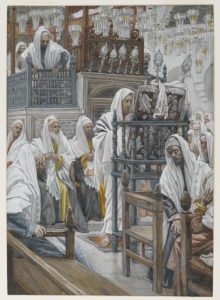
 Jesus Unrolls the Book in the Synagogue (Jésus dans la synagogue déroule le livre) – James Tissot
Jesus Unrolls the Book in the Synagogue (Jésus dans la synagogue déroule le livre) – James TissotThe lectionary is only intermittently committed to the narrative line of Scripture. This Sunday, the Third after Epiphany, brings us back to Luke (specifically Luke 4:14-21), but we’ve skipped an important bit. Two weeks ago we had the Baptism of the Lord from Luke, but we jump right past his temptation in the wilderness, the great test that empowered him to begin his public ministry.
Have no fear: in each year of the lectionary the story of Jesus’ temptation is skipped after his baptism, only to be jammed back in on the First Sunday of Lent. The people behind the lectionary cared even more about matching texts to the liturgical year.
But that scene we skipped, Jesus’ battle with Satan, is what sets the story up for the “Then…” of verse 14 when Jesus began his teaching in the synagogues of Galilee.
That is, Jesus came to his teaching ministry not only having taken the symbolic action of receiving John’s baptism. He also came with the sense of personal victory over the demonic world.
(This would, centuries later, become a trope in the stories of the Desert Fathers and Mothers. You see it most vividly in St. Athanasius’ Life of St. Antony — which is, by the way, a book absolutely worth your time if you want to understand early Christianity and its spiritual life.)
The lectionary also cuts short the story of Jesus’ preaching in Galilee. If you had only this lectionary text to go by, you would be convinced that when Jesus came home to Nazareth, read Isaiah, and proclaimed that he had fulfilled the prophesy, everyone was perfectly pleased. As if they all walked home saying
Well the Messiah has finally come. And it’s our own Jesus! Aw… I knew him when he was just a kid. Remember that time he ran away for a week in Jerusalem?
Nothing could be further from the truth. Sure he was well received in the synagogues he visited before coming back to his home town. But in Nazareth his friends and neighbors responded to his message by trying to murder him.
Again, fear not: the story will conclude next week — we’ll see the attempted murder, but we’ll have to remember for ourselves just how the argument got started.
Luke 4:14-21
So, what do we find in this perhaps oddly cut and oddly set gem of a text?
First we see that people just love Jesus.
This story rings one of the deep supportive bass notes underneath the rise and fall of stories carrying the melody of the Gospels. Most people thought Jesus was just fantastic. They wanted to be around him.
We got the first hint of it when Jesus was a boy of twelve. Luke told us that as he grew he enjoyed the favor or both God and the people (Luke 2:52).
We see it throughout so many stories when he healed all who came to him, and when crowds anticipated his movements, arriving at his destinations before he did.
We see it on Palm Sunday when the crowds waved their palm branches and acclaimed his arrival.
And in a quiet but powerful way we see it in the simple fact that children wanted to be near him.
So in this passage, as he traveled around, teaching in synagogues, he “was praised by everyone” (Luke 4:15).
Second we see his confident awareness of himself as the Messiah.
Jesus, in his home synagogue, receives the honor of being called upon to read from the Scriptures. In later centuries at least, the five books of Moses were divided into a yearly cycle of readings, and a passage of the Prophets would be appointed as well.
In this scene it is unclear whether the passage from Isaiah was a lectionary reading assigned in advance, or whether Jesus opened the scroll to read the passage he himself had in mind.
But however the passage was chosen, nobody seemed to object. Jesus read from Isaiah 61, a beautiful poetic description of the Messiah — the “anointed one” — who comes to bring the day of salvation. And this is to be marked by good news and good action for those who need it most:
The Spirit of the Lord is upon me,
because he has anointed me
to bring good news to the poor.
He has sent me
to proclaim release to the captives
and recovery of sight to the blind,
to let the oppressed go free,
to proclaim the year of the Lord’s favor.” (Luke 4:18-19 NRSV)
Then, having read this most explicitly messianic of texts, Jesus begins his sermon:
Today this scripture has been fulfilled in your hearing.” (Luke 4:21 NRSV)
That’s the only part of the sermon Luke preserves for us — possibly it was cut short by the kerfuffle featured in next week’s text.
But cutting the text at this point leaves us with a very strong emphasis — as strong in its way, really, as the “I Am” sayings in John.
But while John’s “I Am” sayings add together to make a strong claim to Jesus’ divinity, this passage in Luke proclaims instead his “anointed-ness,” his Messiahship.
The interesting thing to me is the way the passage resonates differently in the narrative and in our reading experience.
Within our minds as readers, especially those of us who have been Christians for decades or a lifetime, it is a message which we see as proof of his Messiahship.
Jesus is the Messiah. How do I know? I saw him preaching good news, bringing freedom, providing miraculous healings…
It is all in our past tense. We’ve seen Jesus do these things already.
Within Luke’s unfolding story, Jesus uses the Isaiah passage to proclaim who he is and what he is about to do.
I’m Anointed, the Messiah, and my mission from here on out will be to preach good news, to bring freedom to captives, to provide miraculous healing…
It is all in Jesus’ future, with a gospel full of examples yet to come.
Seeing it within the flow of the story makes it all the more bold.
Jesus, full of the Spirit and fresh from his victory over Satan proclaims something no one has seen the slightest evidence of.
He claims (without basis for all they knew), that he is the promised Messiah, and that he’ll shortly be preaching good news, freeing the oppressed, and offering miraculous healings — and that is shocking enough to spark the violent reaction the lectionary put off till next week.
++++++++++++
My annual lenten prayer class is coming soon! We’ll work on classic approaches to prayer that help re-ground us in Christ and bring focus to our prayer lives. Click the button and get on the waiting list if you want to be notified when it is open for registration.
(This text contains an affiliate link.)
The post Monday Meditation: RCL Year C, 3rd Sunday after Epiphany, Luke 4:14-21 appeared first on Gary Neal Hansen.
January 17, 2019
Letters to a Young Pastor: Dealing with Stress

 Dear ______:
Dear ______:
You are absolutely right: It has been far too long since we’ve written to each other. Thanks for the update on your life in this final year of seminary.
It does sound really stressful.
You probably feel like the weight of the whole world is on your shoulders — like poor old Atlas.
I could act like a cynic and say that the stress of seminary is intended as a beneficial part of your theological education. After all, being a pastor is often stressful, so now is a good time to get used to it.
I won’t say that. But stress is always there to be found, and now is always the best time to find helpful ways to deal with it.
Dealing with Stress
It sounds like you are dealing with stress that is coming at you from several angles at once.
You are still dealing with the grief over your mother’s death.
Your whole campus knows your mom died, so you have to dodge all their well-intentioned attempts to practice their skills at pastoral care.
Your coursework is demanding.
Your field education post is demanding.
Your ordination process for your denomination is demanding.
Your efforts to learn about the available positions to apply for once you graduate are demanding.
It reminds me of a guy in my class on prayer when I was a seminary professor. We had studied and practiced the Jesus Prayer, the ancient Orthodox practice of repeatedly praying,
Lord Jesus Christ, Son of God, have mercy on me.
He tried in good faith for the two weeks we studied the practice, but he just didn’t get it. Rote repetition wasn’t his thing.
Then we got to the end of the year and my assignment was for the students to pray in whatever way they wanted, so long as they used one of the classic practices we’d studied together.
The fellow who couldn’t make heads or tails of the Jesus prayer reported something like this:
I have final papers in all my classes, interviews with churches in two states, and my in-laws are here until graduation. All I can do is say over and over again, ‘Lord Jesus Christ, Son of God, have mercy on me.’
I hadn’t taught the Jesus Prayer primarily as a way of coping with stress, but for that student it proved useful in exactly that way.
It recently worked that way for me too. I had two hospital stays in two weeks, one for surgery and one for subsequent infection. Sometimes I was in pain, and sometimes I was just enduring the long slog away from the fear of death. The TV did nothing for me. I was rarely able to focus on a book.
Like my student, all I could do was say over and over again,
Lord Jesus Christ, Son of God, have mercy on me.
Some can’t abide repetition in prayer, but this prayer is worth repeating.
It is all good prayer distilled to its powerful essence. No matter what our situation, what we really need from God is mercy — we’ve earned nothing, but we need so much from God’s generous grace. We see that generous grace in the face of Jesus, God’s Son, the Second Person of the Trinity incarnate.
As I prayed the Jesus Prayer over and over from my hospital bed, it calmed me. I said it along with my breath. It focused my mind on what is most important: the holy healing presence and mercy of God.
So that’s what I suggest to you in your stressful season of seminary life. You may not feel like you have time for a lengthy daily time of prayer. But you can turn to God in the in-between times — in the morning, at meals, in the evening, as you lay down to sleep — and call out
Lord Jesus Christ, Son of God, have mercy on me.
This has two great benefits.
First, it focuses your heart and mind, leading to increased calm.
Second, and far more important, God hears you and provides the mercy you need.
Go for it. Jesus is waiting to hear from you, and he’s full of mercy.
Yours in the journey,
Gary
++++++++++++
My annual lenten prayer class is coming soon! We’ll work on the Jesus Prayer and other classic approaches to prayer that help re-ground us in Christ and bring focus to our prayer lives. Click the button and get on the waiting list if you want to be notified when it is open for registration.
The post Letters to a Young Pastor: Dealing with Stress appeared first on Gary Neal Hansen.
January 16, 2019
Monday Meditation: RCL Year C, 2nd Sunday after Epiphany, John 2:1-11
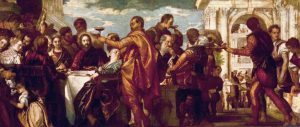
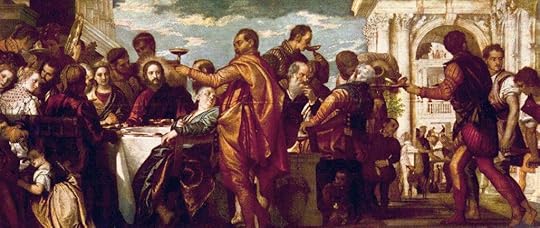 Paolo Veronese, Marriage at Cana
Paolo Veronese, Marriage at CanaThis is the first time since I started writing these “Monday Meditations” that the Gospel text is something I’ve previously published on — like not on my own website, but in an actual book.
John 2:1-11
Back in 2015 I had the privilege of writing the “Theological Perspective” essay on John 2:1-12 for Feasting on the Gospels. The book gave four essays from different academic and pastoral perspectives on every passage of the Gospel. This was a follow-up series to the well-received Feasting on the Word which did the same for every passage used in the Revised Common Lectionary.
I just went back and re-read what I wrote. I’m glad to say I still quite like it.
Jesus’ Glory
It is the story of the wedding at Cana. Back then I focused on the comment at the end that this first miracle of Jesus “revealed his glory” (John 2:11) It is the quiet glory of the incarnation, as the Word made Flesh blesses and makes holy the ordinary things Jesus attends to:
the everyday institution of marriage
the relation between himself as a son and his mother Mary
the human needs of a host who didn’t plan for the feast very well
the usually-ignored servants who end up as the only witness to the miracle.
Even the basic elements of stone and water are blessed and made holy by being the bearers of the miraculous sign.
All this is still true, and still worthy of meditation.
What I note today, however, are two things, one of which I mentioned in that essay and one of which I did not.
Jesus’ Generosity
The one I mentioned, is the sheer laughably exuberantly generous nature of the miracle.
Jesus could have been stingy. He could have turned just enough water into just enough wine. The bridegroom would have saved face and the guests would have been happy. And it would have been just as much a miracle. His disciples, at the end, would still be inspired to believe.
The stingy way, I’m sorry to say, is often the Christian way. We grudgingly help, donate, fund the project. Yes, we provide something for the soup kitchen — hot dogs or baloney sandwiches maybe. Not quite as nice as we’d probably serve our own family.
But the stingy way was not, at all, Jesus’ way. Think about it:
6 stone water jars, 20 to 30 gallons each, filled to the brim.
That’s 120 to 180 gallons of water turned to 120 to 180 gallons of wine.
That’s a minimum of 605 modern 750 ml. bottles of wine
That’s a minimum of 50 cases of wine, with 12 bottles each.
Your takeaway?
When Jesus provides for a human need, say even a fairly non-critical need like wine at a wedding reception, Jesus goes absolutely overboard with generosity.
He made so much wine that they must have had a hard time knowing what do do with it all.
It’s the same generosity you see at the feeding of the 5000. Five loaves and two fish feed 5000 people — and there are TWELVE BASKETS full of leftovers.
If Jesus provided 50 extra cases of wine halfway through a wedding reception, what might we do for the hungry, the homeless, the refugee?
Jesus Saves the Best for Now
The second thing that strikes me today, and the thing I frankly didn’t even comment on in Feasting on the Gospels, is the astonished reply of the steward on tasting the miraculous wine:
…But you have kept the good wine until now.” (John 2:10 NRSV)
There is, of course a funny bit, a humanly honest assessment, when we read the full comment:
Everyone serves the good wine first, and then the inferior wine after the guests have become drunk. But you have kept the good wine until now.” (John 2:10 NRSV)
The steward is basically telling the bridegroom that he’s a bit of a doofus: if he had this good stuff he should have brought it out when the party started, when people still had working tastebuds and active brains.
But the steward doesn’t know that this is miracle wine. This is the gift of redemption, the direct action of God Incarnate to bless a marriage, a host, a celebration.
He does not know that it is miracle wine. He just knows that it is good.
And that is a wonderful comment on every gift of redemption. We look around at life, thinking the party is about to wrap up — but because of Jesus, here is this marvelous gift.
You thought you were dying. But here you have this extra day, this opportunity to enjoy one another, make broken things right, and live into wholeness. Isn’t this day golden?
You have kept the good wine until now.
You thought there was no hope, a career in a shambles, stability and security to be rebuilt from scratch. But then you begin to discover your abilities, your strength, God’s provision. The rediscovery of who you are, and what you can do — it is amazing, and you might have missed it.
You have kept the good wine until now.
You thought addiction was going to be the end of you — relationships destroyed and so much more. But then you found a 12 Step program. God seemed to take you by the hand, and lead you to sanity. You learned new ways of living in the program, and you are happier than you ever were before. You find yourself telling your group that you actually thank God for your addiction because of what you have learned in recovery.
You have kept the good wine until now.
What is lost is truly lost. Grief over the past is very real. And yet, redemption is real too. Strangely, generously, abundantly, Jesus provides. The new wine of redemption does not make you drunk and forget the sorrow. But it does make you aware of real, new, and otherwise impossible joy that could only come now.
You have kept the good wine until now.
++++++++++++
I’d love to send my Monday Meditations (and all my new articles and announcements) directly to you. Just scroll down to the black box with the orange button to subscribe to my weekly(ish) newsletter and they’ll show up right in your inbox.
This post contains affiliate links. That means if you click through to Amazon and purchase one of the excellent books I mentioned (or anything else actually) I’ll get a small commission.
The post Monday Meditation: RCL Year C, 2nd Sunday after Epiphany, John 2:1-11 appeared first on Gary Neal Hansen.
January 8, 2019
Monday Meditation: RCL Year C, Baptism of the Lord, Luke 3:15-17, 21-22
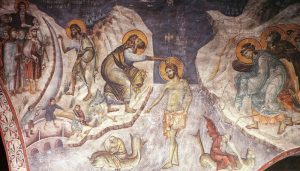
 In the West, the first Sunday after Epiphany celebrates “The Baptism of the Lord.” In Year C the text is Luke 3:15-17, 21-22.
In the West, the first Sunday after Epiphany celebrates “The Baptism of the Lord.” In Year C the text is Luke 3:15-17, 21-22.
This is the event which Eastern Orthodoxy celebrated on Epiphany itself, or as they often call it, the Theophany.
By way of definitions:
“Epiphany” means “appearance” or “manifestation.” In the West we think of this as the manifestation of Christ to the non-Jewish nations.
A “Theophany,” on the other hand, is specifically an appearance or manifestation of God to human sight.
I have pretty good reason to suspect that most Protestants don’t really know what to make of the Baptism of Christ. Well, we think, it shows his humility: God in the flesh stoops down to receive a baptism that is otherwise for the forgiveness of sins.
Beyond that, though, we are often at a loss. Christ, we say, is fulfilling all righteousness by being baptized — and yet no law required it of him.
So what to think? And what to say from the pulpit?
Luke 3:15-17, 21-22
I suggest we take a page from the Orthodox on this one. For the Christians of the East, Christ’s Baptism is a huge big deal. They see it as crucial to our salvation, one of the highest and most holy celebrations. It is right up there with Easter (though really nothing is quite so big as Easter) and Christmas.
Epiphany is not, by the way, “Orthodox Christmas,” as you may have heard it called. They celebrate both in a very big way. One is Jesus’ birth. The other is his baptism.
I wish I could write you a very long post today, mining the Baptism of Christ in Orthodox hymnody, but I’m recovering from two weeks of very serious illness, and I’ll keep it short.
Let me give you the one hymn that gets repeated over and over throughout the season like an Evangelical praise song (which, in a very strong sense, it is). I’ve quoted it from the inimitable Ages Initiative Digital Chant Stand.
Apolytikion of the Feast. Mode 1.
As You were baptized in the Jordan, O Lord,
then the worship of the Trinity became manifest,
for the voice of the Father bore witness to You,
naming You the Beloved Son;
and the Spirit, in the form of a dove,
confirmed the certainty of the word.
O Christ God, who appeared and illumined the world,
glory to You.
This hymn tells you why the Baptism of Jesus is so important: this scene, recounted fully in Matthew, Mark, and Luke and partially in John, is the first clear revelation of the Holy Trinity.
The Father speaks.
The Son is baptized.
The Spirit descends.
Christ himself is truly God, the Second Person of the Trinity incarnate. In Luke this is most pointedly the case, since the earlier passages have strongly emphasized Jesus’ birth from the Virgin Mary with God as his actual Father.
So in this scene what we learn to do is worship the Trinity. Or perhaps we could say this scene reveals the true Triune nature of the God we worship.
Yes, looking back through the lens of this and other New Testament passages you will see myriad hints of the Triune nature of God in the Old Testament.
But it is here, at his Baptism, that the Trinity is manifest. And so we worship.
The Trinity? Is That a Big Deal?
There is, alas, some chance that you, dear reader, do not think this is a very big deal. In the lived Christianity of today’s Protestantism many think the Trinity is a vague bit of slightly irrelevant speculation.
Nothing could be further from the Truth.
We want Christ alone. Jesus, we say, is the full and sufficient revelation of God, and all we need do is accept him, trust him, follow him.
But where does our beloved Jesus actually lead us? To the revelation of his Father and the Holy Spirit. Jesus leads us to know God, as fully as we broken humans can know and love and trust him.
From this moment of his emergence into public ministry, to the Transfiguration, to his teaching in John, and to the very Cross itself, Jesus is leading us to know not only himself, but the Trinity.
The Trinity is our God. Mysterious, yes, and quite beyond the intellectual grasp of any human mind.
The fact that God exists eternally as One God in Three Persons is something we know by revelation.
And for this revelation, of truly knowing something of the eternal nature of God, we must give thanks.
The only right response is worship.
++++++++++++
I’d love to send you all my Monday Meditations (as well as my other new articles and announcements). Just scroll down to the black box with the orange button and subscribe to my weekly(ish) newsletter and they’ll come to you by email.
The post Monday Meditation: RCL Year C, Baptism of the Lord, Luke 3:15-17, 21-22 appeared first on Gary Neal Hansen.
January 2, 2019
Monday Meditation: RCL Years ABC, Epiphany of the Lord, Matthew 2:1-12
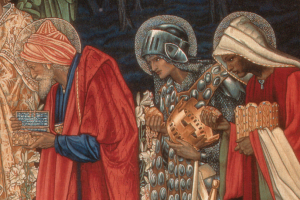
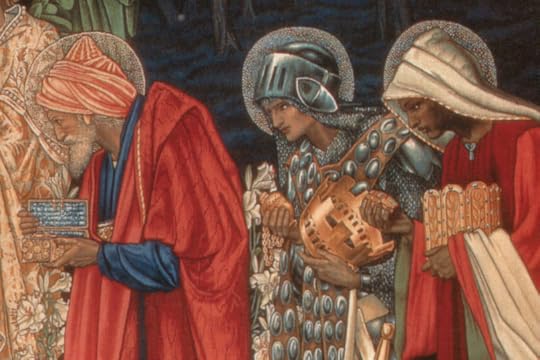 Epiphany?
Epiphany?January 6 is “Epiphany” wherever you may be, but the celebration has a different emphasis in the West than the East.
The word itself means “appearance” or “manifestation.” In the Western Church year it is about the appearance, or manifestation of Christ to the non-Jewish nations of the world. That’s you and me, Bub.
He was a Jew, and came first to the Jews — so let all anti-Semites take pause — but even in infancy God was making it clear that he was to be savior of all.
In Orthodoxy it is a much bigger celebration, a serious rival to Christmas. The focus there is on the Baptism of Christ by John. But that’s a matter for another day.
In the West Epiphany gets far too little attention. If January 6 doesn’t happen to fall on a Sunday, most Protestants will not notice it slipping by.
After all, in year C last Sunday Jesus was 12 years old in the Temple. So why are we turning back the clock to Matthew 2:1-12, the coming of the “Magi from the East?”
Matthew 2:1-12
I do prefer to stick with calling them by the term used in the Greek: they are “Magi.” It’s a mysterious sort of title.
They are not specifically stated to be men, or even wise, though they certainly were the latter.
They are not stated to be either three, or kings, as the old carol and much lore would tell us.
But they did come from “the East,” from a faraway country. They were not Jews. They did not seek the newborn King of the Jews because the biblical prophets had told them to.
No, they came because they had inquiring minds. They sought the truth, and the meaning of things, using the science and insight of their own culture.
And they found Jesus.
What was that?
Though they were not the People of the Covenant, they found Jesus.
And they worshiped him.
Once their own knowledge led them to the Truth, they bowed down, worshipped, and gave gifts.
The wrong people came, they came the wrong way, and God welcomed them.
And it seems quite reasonable to say that the resources these Magi gave the Holy Family, the gold frankincense and myrrh, made it possible for the infant Jesus to survive his refugee flight to Egypt and return to be your savior.
So you owe your salvation to a roving band of godless foreigners.
Generous foreigners who helped refugees.
Apolytikion of the Feast
The Orthodox sing of the coming of the Magi all through Advent. Though for them it is not an Epiphany hymn, this short piece (from the amazing Digital Chant Stand of the Ages Initiative) captures what I think is most important in the Western celebration:
Your nativity, O Christ our God,
has caused the light of knowledge
to rise upon the world.
For therein the worshippers of the stars
were by a star instructed to worship You,
the Sun of Righteousness,
and to know You as Orient from on high.
Glory to You, O Lord.
I could say more, but I’m under the weather and want instead to get this out to you with the following five Epiphany observations as we move into a new year as God’s people on this troubled globe.
The wrong people can find Jesus.
The wrong knowledge can lead them to Jesus.
People from the wrong places may well belong to Jesus, now, or in the future, unawares.
What you do to the least, you do to Jesus.
And that refugee on the news faces circumstances much like those Jesus faced.
++++++++++++
I’d love to send all my Monday Mediations (as well as my other new articles and announcements) straight to your inbox. Just scroll down to the black box with the orange button to subscribe and all this will be yours…
The post Monday Meditation: RCL Years ABC, Epiphany of the Lord, Matthew 2:1-12 appeared first on Gary Neal Hansen.
December 24, 2018
Monday Meditation: RCL Year C, 1st Sunday after Christmas, Luke 2:41-52
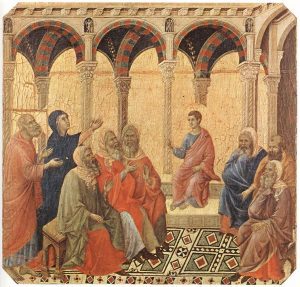
 Ducciodi Buoninsegna, Disputation with the Doctors
Ducciodi Buoninsegna, Disputation with the DoctorsMy oh my, do little kids change fast. This Sunday Jesus is twelve years old. It seems like only a week ago he was a babe in Mary’s arms.
Wait a minute. That really was just a week ago.
The lectionary has jumped ahead a bit.
There are a couple other passages concerning Christ’s infancy in Luke. But you’ll hear those Tuesday, on January 1 when your church holds that special service celebrating the Holy Name of Jesus, and on Saturday February 2 when you all gather to celebrate the Presentation of the infant Jesus in the temple.
What? Your congregation doesn’t celebrate either of those Holy Days? Shocking.
Let’s just say the Protestants didn’t push for too much adaptation of the Catholic lectionary cycle when they developed the RCL.
Luke 2:41-52
It is a very interesting passage though. As the only recorded scene of Jesus’ life between infancy and adulthood Luke 2:41-52 is a treasure.
It is also pretty hilarious when you think about it.
The Holy Family had travelled to Jerusalem for Passover, keeping to the rich practice of their Jewish faith. They did it every year, apparently with a large contingent of extended family and friends. It must have been a combination of religious holiday, pilgrimage, and group vacation.
Parents of the Year (Not)
Then it all went terribly, terribly wrong.
If Mary and Joseph hadn’t actually heard the saying that it takes a village to raise a child, they certainly acted like it was true. They headed back toward their home town, trusting that Jesus was safe the care of — well, someone. No worries.
Then after traveling a whole day, they noticed Jesus wasn’t actually with them (Luke 2:44).
My kids haven’t quite reached the pre-teen stage, but they make enough of a splash most of the time that their absence would be noticeable.
The text is silent as to their conversation when Mary and Joseph realized they’d lost the Son of God. There might have been some… unguarded words.
They asked around. No Jesus.
They headed back to Jerusalem — a second whole day (Luke 2:45).
After they went to the police and filed a Missing Savior report, they searched.
And they searched.
And they searched.
For three days they searched (Luke 2:46).
Imagine their anguish. They would have put his picture on milk cartons, but milk cartons hadn’t been invented yet.
Maybe you’ve wondered why Jesus was born at that very particular time and place. Consider: if he’d been born here and now he might been snatched up by Child Protective Services and spent his teen years in foster care.
The Temple
Finally Mary says to Joseph:
Oh Joseph I’m so afraid. What if we never find him?
He thinks a minute.
I think we’d better go to the Temple and pray,
says Joseph.
But I’m so ashamed! How can I tell his Father I lost Jesus?
cries Mary.
Honey, it isn’t like He doesn’t know.
So off they go, their thoughts a scramble of despair and hope.
Surely God won’t let something awful happen to Jesus.
But then being abandoned by your parents in a strange city for five days is pretty traumatic in itself.
Lost and Found and Lost
When they got inside they saw a little cluster of people sitting and talking. Grown men, some older, some younger — the teachers of God’s law.
As they came closer they could hear a familiar voice — Jesus.
There he was in the middle of the group, his face shining with joy and intelligence as he discussed and debated with the men.
O Lord,
said Mary, and Jesus looked up.
He waved and smiled — and then he went back to his conversation.
Then someone — was it Mary? or Joseph? — walked into the middle of things, and pulled the boy away. Witnesses disagreed as to whether they took him by the elbow or by the ear.
Then Mary, crying, laughing, and completely exasperated, spoke to her son:
Child, why have you treated us like this? Look, your father and I have been searching for you in great anxiety.” (Luke 2:48 NRSV)
At least that was the official version. It sounds pretty tame to me, speaking as a parent.
Jesus didn’t get it:
Why were you searching for me? Did you not know that I must be in my Father’s house?” (Luke 2:49 NRSV)
Kind of saucy, don’t you think?
Sometimes the simple truth does sound that way.
She knew then that she’d lost him. They spend most of a week searching for a missing boy, and instead they found a young man.
He still had a lot of growing to do. Thankfully he was a good kid — a good man. Overall he was an obedient son. Everybody liked who he was becoming. Everybody:
And Jesus increased in wisdom and in years, and in divine and human favor.” (Luke 2:52 NRSV)
But Mary had a lot to think about, deep in her heart (Luke 2:51). Raising a child is always about letting go, watching while part of your soul moves away and into the world.
But did it have to be so painful?
++++++++++++
I’d love to send you all my Monday Meditations (along with my other new articles and announcements). Scroll down to the black box with the orange button and subscribe to my weekly(ish) newsletter and they’ll be in your inbox.
The post Monday Meditation: RCL Year C, 1st Sunday after Christmas, Luke 2:41-52 appeared first on Gary Neal Hansen.



